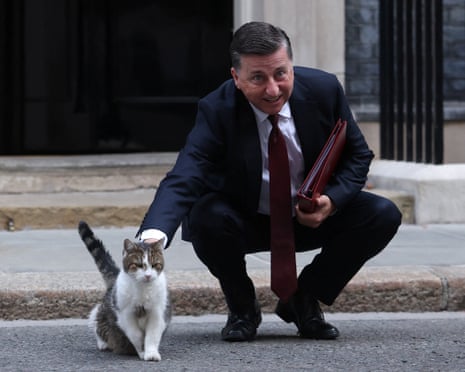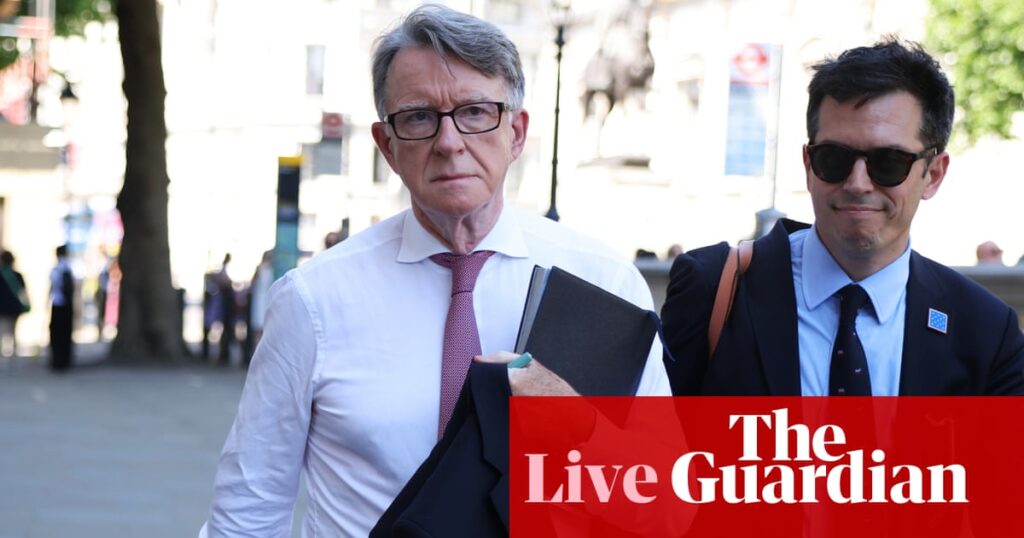Labour MPs despondent after turbulent week, says cabinet minister
Douglas Alexander said he understood that Labour MPs would be “despondent” as a result of two significant departures in the past two weeks.
The Scotland secretary told BBC Breakfast:
Many of us were devastated by Angela Rayner’s departure from the government last week. She’s an extraordinary woman who’s overcome the most extraordinary challenges and we are grieving and feel quite acutely that sense of loss.
Now to have the dismissal of Peter Mandelson just the next week, I totally get it, of course Labour MPs will be despondent that in two weeks in a row we have seen significant resignations from public service.
These are not the headlines any of us in government or in parliament would have chosen or wanted. But the fact is when the evidence emerged, action had to be taken and we are looking forward, therefore, to moving on.
He added that “while the politics is really hard”, there were still “policy achievements under way”.

Meanwhile, the new housing secretary has said that the government is “absolutely committed” to its pledge to build 1.5m new homes in England by 2029.
Steve Reed said the government was standing firm behind the vow, which was part of Labour’s pre-election manifesto, telling the BBC: “It’s what we’re going to do.”
Reed told the broadcaster:
We’ll do it by working in partnership with the developers and with the builders. My job is to get every barrier out of the way that is stopping that construction going ahead.
More on both of these stories in a moment, but first here are some other key developments:
-
The UK economy flatlined in July, according to official figures, in grim news for Rachel Reeves as she gears up for a challenging budget. It was a slowdown compared with June, when the economy grew by 0.4%, according to the Office for National Statistics.
-
Britain will not rejoin the EU in the foreseeable future, according to the minister who has piloted Keir Starmer’s recent reset of European relations. Nick Thomas-Symonds said he could not see the country re-entering the bloc in his lifetime, despite the thaw in continental relations that he has helped bring about.
-
Up to 400 large shops are at risk of closure with as many as 100,000 jobs at risk if the government goes ahead with plans to hit stores with higher business rates, retailers have warned. Some of the UK’s largest retail premises, including supermarkets and department stores, would face higher property tax charges under new rules being considered by the government before November’s budget.
-
Transport for London has invited the RMT to resume talks as the union’s week of strikes comes to a close, with the tube expected to restart gradually, with early disruption, on Friday. The RMT did not confirm whether it would accept TfL’s invitation to further talks next Wednesday, after saying further strikes could follow.
-
Special needs reforms for children in England could turn into “welfare reforms mark 2” unless the government can convince parents that it is not aiming to save money, according to a report by the Institute for Fiscal Studies. The thinktank said any changes to the current system of education, health and care plans (EHCPs), which mandate tailored support for children with special needs, will be highly controversial among parents, but said reform was “long overdue” as the number of EHCPs issued has ballooned by 80% since 2018.
-
Hospices are “on the brink” and two in five are making cuts this year despite the importance of end-of-life care if assisted dying becomes legal, the sector has warned before the first House of Lords debate on the legislation. The terminally ill adults (end of life) legislation is due to have its second reading in the House of Lords on Friday.
Key events
Peter Mandelson’s career was described as durable to an audience of foreign policy top brass just five days ago, writes the Guardian’s diplomatic editor, Patrick Wintour.
Here he writes about the ambassador whose panache made him a big hitter in Washington DC:
Speaking at the Reform press conference in Caerphilly, Nigel Farage said he had a “very expensive week” seeking advice from tax experts, reports the PA news agency.
The Reform UK leader said last year he had bought a home in his Essex constituency, but it was later reported that his partner had actually made the purchase. Questions over the home have resurfaced after Angela Rayner resigned last week over underpaying stamp duty on a seaside flat she bought this year.
Farage said his partner Laure Ferrari is the sole owner of the Clacton property but has faced calls to explain the situation amid suggestions he could have structured the purchase in order to avoid paying additional tax.
He said:
The money was legally hers, she bought the house. I don’t have any financial stake in it whatsoever – other than she lets me stay there.
Farage told reporters he had sought the advice of a King’s Counsel (KC) tax expert about the situation. He said:
I have paid a lot of money to make sure we have done everything right.
He added that he was “really concerned” that some media reports were “beginning to stray” into “libel territory”. Farage added:
I have done everything I can to prove everything I have done has been legal and correct.

Jakub Krupa
Poland’s Radosław Sikorski has met UK foreign secretary Yvette Cooper in Kyiv earlier this morning, the Polish ministry of foreign affairs confirmed.
The pair talks about the situation in Ukraine and the eastern flank of Nato following the Russian drone incursion into Poland, the ministry said.
UK national security adviser Jonathan Powell also joined the meeting, it added.
You can follow more updates from Europe in Jakub Krupa’s live blog:
Reform UK has selected a former communications chief as its candidate in a by-election in Wales, reports the PA news agency.
Llyr Powell has been chosen to run for the party in the vote in Caerphilly, expected to take place on 23 October. Powell previously worked as a communications specialist for the party in Wales.
The byelection was called after the death of Labour politician Hefin Wyn David, who had served as member of the Senedd for Caerphilly since 2016.

Mark Sweney
Peter Mandelson’s advisory firm is cutting ties with him after his firing as US ambassador after the extent of his relationship with paedophile Jeffrey Epstein was revealed in emails.
Global Counsel, which Mandelson co-founded in 2010 alongside Benjamin Wegg-Prosser, is in the process of selling off his multimillion pound stake to a new investor. The sale is expected to conclude within the next two months.
Mandelson’s ties to Global Counsel came under fresh scrutiny after the depth and extent of his relationship with Epstein was revealed by the emails, including the suggestion that his first conviction was wrongful and should be challenged.
His relationship with Epstein extended to labelling him his “best pal”, and a photograph emerged this week of Mandelson lounging in a white bathrobe with Epstein.
One of Mandelson’s emails to Epstein said: “Your friends stay with you and love you.”
The company, which helps clients “anticipate regulatory and political change”, has advised firms including JP Morgan, Barclays, Open AI, Anglo American, fast-fashion retailer Shein and social video platform TikTok.
Archie Norman, the chair of FTSE 100 retailer Marks & Spencer, is its vice-chair.
Mandelson, who was a minister in Sir Tony Blair’s Labour government but was forced to resign twice, stepped back from Global Counsel after being appointed by prime minister Sir Keir Starmer as UK ambassador to the US in December.
In January, he entered into an agreement with Global Counsel to sell his stake in the business over time, but recent Companies House filings have shown he still retains a 21% stake. In May last year, Mandelson resigned as a director.
UK imposes 100 new sanctions targeting Russia’s revenues and military supplies

Jamie Grierson
The UK government has implemented 100 new sanctions designed to hit Russia’s revenues and military supplies, including against its so-called shadow fleet carrying oil and electronics companies.
The move announced by the UK foreign secretary, Yvette Cooper, as she travels to Kyiv, comes as Vladimir Putin continues to obstruct peace efforts by launching the largest air attack of the war against Ukraine, with more than 800 missiles and drones fired in a single night.
The numbers of Russian drones and missiles launched against Ukraine – 6,500 in July alone – are 10 times the level of a year ago, with recent strikes directly hitting the Ukrainian cabinet of ministers, damaging the British Council and EU delegation buildings in Kyiv and a violation of Nato airspace over Poland.
On Friday, sanctions were imposed on 70 more ships in Russia’s “shadow fleet” that transport Russian oil, while 30 entities and individuals supporting Russia’s war machine by supplying key equipment such as electronics, chemicals and explosives used to manufacture missiles and other weapons systems were also targeted.
Sanctions have also been imposed on the China-based Shenzhen Blue Hat International Trade Co, and its Russian co-owners, Elena Malitckaia and Alexey Malitskiy, and Turkey-based MastelMakina İthalat İhracat Limited Şirketi and its chief executive, the Azerbaijani national Shanlik Shukurov.
Cooper, appointed UK foreign secretary in Keir Starmer’s reshuffle one week ago, said:
The UK will not stand idly by as Putin continues his barbaric invasion of Ukraine. His complete disregard for sovereignty has been shown this week when he recklessly sent drones into Nato airspace. The security of Nato and Ukraine are crucial to the UK’s security – an integral part of the prime minister’s plan for change.
International action to increase economic pressure on Russia and to cut off critical cashflows which he desperately needs to pay for this illegal war is vital. These sanctions form the next stage in the UK’s leading efforts to ramp up economic pressure alongside our security support and our work alongside the coalition of the willing for a just and lasting peace in Ukraine.
UK economy flatlines in July in grim news for Rachel Reeves

Heather Stewart
The UK economy flatlined in July, according to official figures, in grim news for Rachel Reeves as she gears up for a challenging budget.
It was a slowdown compared with June, when the economy grew by 0.4%, according to the Office for National Statistics.
GDP expanded strongly in the first half of the year, making the UK the fastest-growing economy in the G7, but it had been widely expected to slow in the second half.
The ONS said that growth in the services and construction sectors in July was offset by a 0.9% fall in the production sector, which includes manufacturing.
The downbeat data will raise questions about Labour’s promise to kickstart the economy.
A Treasury spokesperson said:
We know there’s more to do to boost growth, because, whilst our economy isn’t broken, it does feel stuck. That’s the result of years of underinvestment, which we’re determined to reverse through our plan for change.
The ONS said that GDP grew by 0.2% in the three months to July, compared with the three months to April, down from 0.3% in the three months to June. Statisticians see three-month figures as a better guide to the underlying health of the economy than one-month data, which tends to be more volatile.
ONS director of economic statistics Liz McKeown said:
Growth in the economy as a whole continued to slow over the last three months. While services growth held up, production fell back further.
Within services, health, computer programming and office support services all performed well, while the falls in production were driven by broad-based weakness across manufacturing industries.
Mandelson’s appointment was ‘judgment’ that ‘unconventional ambassador’ was required, says Alexander
Peter Mandelson’s appointment as ambassador to the US was a “judgment” that an “unconventional presidential administration” required an “unconventional ambassador”, a cabinet minister has said.
Scotland secretary Douglas Alexander told Sky News he had reacted with “incredulity and revulsion” to the publication of emails between Lord Mandelson and paedophile Jeffrey Epstein, adding he was “not here to defend him”.
Alexander said:
What is important is to know that when the prime minister became aware of the content of those emails on Wednesday, by Thursday morning Peter Mandelson was dismissed as the ambassador.
The reason he was appointed was a judgment, a judgment that given the depth of his experience as a former trade commissioner for the European Union, his long experience in politics, and his politics and doing politics at the highest international levels, he could do a job for the United Kingdom.
We knew this was an unconventional presidential administration and that was the basis on which there was a judgment that we needed an unconventional ambassador.
Alexander reiterated that Keir Starmer had acted “on the basis of evidence” when dismissing Mandelson.
The Scotland secretary told Sky News:
New evidence emerged on Wednesday evening and the prime minister dismissed Peter Mandelson on Thursday morning.
I have worked in Downing Street in the past closely with prime ministers Tony Blair, Gordon Brown and others. Prime ministers are making a whole range of decisions each and every day. I actually want a prime minister who works on the basis of evidence.
When those emails emerged, that was materially new evidence in relation to the extent of the character and the nature of the relationship between Peter Mandelson and Jeffrey Epstein. When that reached the prime minister’s desk, he acted and dismissed the ambassador.
Alexander added that he was not aware of what had been revealed during Lord Mandelson’s vetting as it was “necessarily a secret matter”.
Spotlight falls on Starmer’s political judgment after Mandelson sacking

Rowena Mason
Keir Starmer is facing serious questions about his political judgment after he was forced to sack his US ambassador, Peter Mandelson, over his friendship with Jeffrey Epstein.
In the second damaging departure for the government in a week, the prime minister withdrew support for Lord Mandelson over emails to Epstein from 2008 suggesting his sentence for soliciting a child for prostitution should be challenged.
The scandal comes at a disastrous time for Starmer ahead of Donald Trump’s state visit to the UK next week. He is also facing an internal Labour battle over the deputy leadership after his deputy prime minister, Angela Rayner, had to resign last week over her tax affairs.
While No 10 was hoping the sacking would show decisive action by the prime minister, Starmer quickly became the focus of criticism over his decision to appoint Mandelson in spite of warnings about his chequered past and his defence of the US ambassador up until Wednesday.
The prime minister was also urged to clarify whether there were concerns from security officials about Mandelson, after Sky News reported that red flags were raised by intelligence services in the vetting process. It is understood that any concerns about security were likely to have been contained in a risk assessment from government officials, rather than from the intelligence agencies.
However, another government adviser said they had raised informal doubts within Whitehall about Mandelson’s 2005 association with Russian oligarch Oleg Deripaska but said they were reassured that he was a good appointment because he was “such a master of the dark arts”.
Some Labour MPs are furious about yet another political blunder in the week after Rayner’s resignation, with a number of them angered by what they regard as the influence of Morgan McSweeney, Starmer’s chief of staff, who is known to be politically close to Mandelson. One Labour MP described it as a “boys’ club sticking up for their own” and another suggested that some in No 10 “think it’s OK for their mates to do bad things”.
Peter Mandelson would not have been appointed as US ambassador had the prime minister known the depth of his association with the paedophile Jeffrey Epstein, a cabinet minister has said.
Scotland secretary Douglas Alexander told BBC Breakfast:
Nothing justifies Peter Mandelson’s appointment in light of what has now emerged and our thoughts have to be with everyone affected by Jeffrey Epstein’s heinous crimes.
But the reality is, in the last couple of days Peter Mandelson was in the White House with Donald Trump. The reality is the United Kingdom did the first trade deal of any government with the Trump administration. And the reality is, along with Peter Mandelson, the prime minister Keir Starmer has established a strong and important relationship with President Trump in the interests of the United Kingdom.
So, in retrospect, of course, if [it] had been known at the time what is known now, the appointment wouldn’t have been made.
But it is possible that two things are true at once. On one hand, Peter Mandelson did bring some very particular qualities to that job and to that diplomatic post, and on the other hand, as has been confirmed, there were manifest weaknesses of his judgment that have been brutally exposed by these emails.
Labour MPs despondent after turbulent week, says cabinet minister
Douglas Alexander said he understood that Labour MPs would be “despondent” as a result of two significant departures in the past two weeks.
The Scotland secretary told BBC Breakfast:
Many of us were devastated by Angela Rayner’s departure from the government last week. She’s an extraordinary woman who’s overcome the most extraordinary challenges and we are grieving and feel quite acutely that sense of loss.
Now to have the dismissal of Peter Mandelson just the next week, I totally get it, of course Labour MPs will be despondent that in two weeks in a row we have seen significant resignations from public service.
These are not the headlines any of us in government or in parliament would have chosen or wanted. But the fact is when the evidence emerged, action had to be taken and we are looking forward, therefore, to moving on.
He added that “while the politics is really hard”, there were still “policy achievements under way”.
Meanwhile, the new housing secretary has said that the government is “absolutely committed” to its pledge to build 1.5m new homes in England by 2029.
Steve Reed said the government was standing firm behind the vow, which was part of Labour’s pre-election manifesto, telling the BBC: “It’s what we’re going to do.”
Reed told the broadcaster:
We’ll do it by working in partnership with the developers and with the builders. My job is to get every barrier out of the way that is stopping that construction going ahead.
More on both of these stories in a moment, but first here are some other key developments:
-
The UK economy flatlined in July, according to official figures, in grim news for Rachel Reeves as she gears up for a challenging budget. It was a slowdown compared with June, when the economy grew by 0.4%, according to the Office for National Statistics.
-
Britain will not rejoin the EU in the foreseeable future, according to the minister who has piloted Keir Starmer’s recent reset of European relations. Nick Thomas-Symonds said he could not see the country re-entering the bloc in his lifetime, despite the thaw in continental relations that he has helped bring about.
-
Up to 400 large shops are at risk of closure with as many as 100,000 jobs at risk if the government goes ahead with plans to hit stores with higher business rates, retailers have warned. Some of the UK’s largest retail premises, including supermarkets and department stores, would face higher property tax charges under new rules being considered by the government before November’s budget.
-
Transport for London has invited the RMT to resume talks as the union’s week of strikes comes to a close, with the tube expected to restart gradually, with early disruption, on Friday. The RMT did not confirm whether it would accept TfL’s invitation to further talks next Wednesday, after saying further strikes could follow.
-
Special needs reforms for children in England could turn into “welfare reforms mark 2” unless the government can convince parents that it is not aiming to save money, according to a report by the Institute for Fiscal Studies. The thinktank said any changes to the current system of education, health and care plans (EHCPs), which mandate tailored support for children with special needs, will be highly controversial among parents, but said reform was “long overdue” as the number of EHCPs issued has ballooned by 80% since 2018.
-
Hospices are “on the brink” and two in five are making cuts this year despite the importance of end-of-life care if assisted dying becomes legal, the sector has warned before the first House of Lords debate on the legislation. The terminally ill adults (end of life) legislation is due to have its second reading in the House of Lords on Friday.

